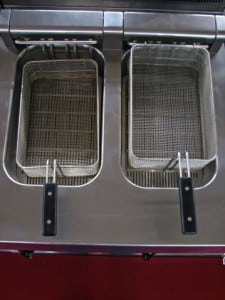 Keeping commercial fryers and grills clean and ready for customers isn’t always a fun chore, but it is definitely necessary to ensure that customers receive the highest quality of food possible.
Keeping commercial fryers and grills clean and ready for customers isn’t always a fun chore, but it is definitely necessary to ensure that customers receive the highest quality of food possible.
Old frying oil can distort flavors in food, creating a bad taste in the mouth of customers. Previous food stuck to the grill can give off a burnt flavor and alter the taste of food grilled after.
Keeping grills and fryers clean may also help:
– Increase efficiency. Without grime the equipment can work better by maintaining a proper balance of heat to cook food evenly. This can also boost food service times and avoid delays caused by breakdowns.
– Spot any potential problems with the equipment early on. With a clean piece of equipment, it is simple to determine if there are any potential problematic issues.
– Boost employee safety. Grills and especially deep fat fryers produce a lot of grease, which can be slippery. By maintaining the outside as well as the inside of the equipment, the opportunity for a slip-and-fall accident caused by dripping oil is dramatically reduced.
– Motivate employees to keep all areas of the business clean since high standards are being set in the kitchen.
It sounds like a pretty daunting task, but it really doesn’t take much to keep a commercial fryer or grill clean. A quick wipe down during the shift and a regular cleaning of grill plates/grates and fry baskets at the end of the day and staff members are ready for the next business day. Some other tips to keep in mind:
Properly train staff members. Let them know that the business has a “clean-as-you-go” philosophy when dealing with spills, drips and splatters. Oil splatters caused by fryers can damage nearby walls and food crumbs that fall out of the baskets can burn in the oil if left alone.
Insist that grills and fryers be cleaned on a regular basis. It goes without saying that the exterior should be wiped down at the end of each day. Any removable pieces of equipment, such as fry baskets and grill plates should be removed and properly washed after closing so they have time to air dry properly before the next day’s first shift. Wet fry baskets should never be placed back in oil because the water will create a popping sensation in the hot oil, resulting in dangerous splatters that can burn employees.
Tackle the grill frequently. To clean the grill, make sure it is off and completely cooled. Follow the manufacturer’s instructions about any special cleaning specifications for your make and model of grill. Generally, grills are cleaned by scraping the grates to remove any food particles (wear heat-resistant gloves in case there are still some warm spots since it is so hard to cool down a grill). Wipe away the debris. Empty the grease tray into a proper grease disposal container. Clean the grill’s exterior and degrease the control knobs. Dry any wet spots immediately.
Get the right cleaner for the job. There are many different types of cleaning products on the market, so you want to be sure to stock the janitorial closet with the right cleanser.
The Web site www.worldwidejanitor.com carries a complete line of wholesale commercial and industrial cleansers from the Snee Chemical Company that are formulated for commercial fryers and grills. Deep Fat Fry Cleaner Powder, for example, is a product that effortlessly removes baked-on grease from fryers, leaving them odorless and ready for fresh oil. Oven, Grill & Fry Cleaner uses an alkaline formula to remove grease and oil from grills and fryers as well as ovens and pots and pans.
Use the right cleaning tools. In addition to the proper cleaners, employees will need special cleaning tools, especially for the grill. Depending on the equipment in the restaurant (flattop stove, griddle, cooktop or grill), you may need a grill scraper or grill block; wire grill brush; and/or heat resistant gloves in case the grill is still a little warm in spots while cleaning.
Insist on annual inspections and regular maintenance. During an annual inspection, look for loose fittings or leaks. Whenever the oil is changed in the fryer, check out the heating elements that are normally submerged in oil.






The article doesn’t tell how to clean inside of the cabinet, where are the working parts are located. How do you clean it without damaging the electrical components?
the article does not highlight how the internal part of the deep fat fryer is supposed to be cleaned without compromising the electrical system of the machine.